As the year comes to a close, it’s the perfect time to reflect on your financial and personal goals, including your estate plan. Estate planning is a critical task that ensures your assets are protected and distributed according to your wishes. To help you stay on track, we’ve compiled a comprehensive year-end checklist. This guide will walk you through the essential steps you need to take to secure your legacy and provide peace of mind for you and your loved ones.
Update Health Care Proxy and Power of Attorney: It’s crucial to have your healthcare proxy and power of attorney documents up to date, especially if you were to become incapacitated. These documents ensure that your healthcare and financial decisions are managed according to your preferences.
Review Beneficiary Designations: Start by taking a close look at the beneficiaries listed on your retirement accounts and life insurance policies. Relationships can change over time, and it’s important to ensure that your current wishes are accurately reflected in your beneficiary designations.
Consider Long-Term Care Planning: Regardless of your age, it’s always a good time to explore options for protecting your assets in the event that you need nursing home care in the future. Long-term care planning can help safeguard your estate and provide peace of mind.
Fund Your Revocable Trust: If you have a revocable trust, make sure that all relevant assets are properly titled in the name of the trust. This includes re-titling real estate, non-business bank accounts, non-retirement brokerage accounts, and other assets to avoid probate and ensure a smooth transition to your beneficiaries.
Protect New Assets: If you’ve acquired new assets this year—like a new home, sold a business, or received an inheritance—ensure these are included in your estate plan. This helps avoid probate and potential complications for your beneficiaries.
Review Insurance Coverage: Take time to review your auto and homeowners insurance policies to ensure you have adequate coverage. Discuss with your insurance agent about any potential discounts you might be eligible for, such as good driver credits or senior discounts.
Consider Life Changes: Major life events such as marriage, the birth of a child or grandchild, or the loss of a loved one may necessitate changes to your estate plan. Additionally, if you have children who may struggle with managing money, are going through a divorce, or have special needs, tailor your plan to address these unique circumstances.
Discuss Your Plan with Family: Open communication with your family is key to preventing conflicts and ensuring everyone understands your wishes. Having these conversations now can prevent disputes and complications later on, providing clarity and peace of mind for everyone involved.

